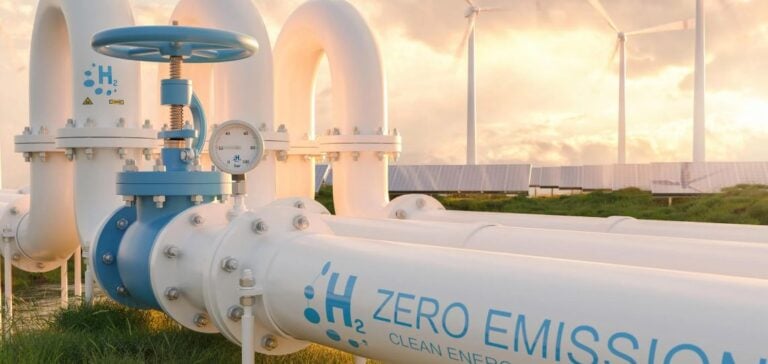Green hydrogen production, often viewed as the key to decarbonizing heavy industries, is set to cross a critical threshold thanks to a significant drop in costs forecasted over the next decade. Currently, the average cost of green hydrogen production (or Levelized Cost of Hydrogen, LCOH) stands between $6 and $7 per kilogram, hindering its widespread adoption.
According to ABI Research, a technology intelligence firm, the average production price is expected to decrease to $2.5 per kilogram by 2030. This pivotal shift results from a combination of factors, including improved electrolyzer efficiency and lower installation costs. The trend will continue, reaching $1.80 per kilogram by 2040 and $1 per kilogram by 2050.
Technological innovations at the heart of the transition
Specialized electrolyzer companies such as ITM Power, Siemens Energy, and Plug Power play a central role in this cost reduction. Their efforts to enhance technological performance and reduce capital expenditure (CAPEX) have led to significant advancements. Meanwhile, actors like Schneider Electric and SunGreen H2 are focusing on lowering operational expenditure (OPEX).
The industrial adoption of green hydrogen also depends on the declining cost of renewable energy, another major component of LCOH. These trends are expected to make green hydrogen increasingly competitive compared to polluting alternatives.
A strategic issue for heavy industries
For sectors such as aviation, steel, shipping, and chemicals, transitioning to green hydrogen is essential to meet carbon neutrality goals. However, cost remains a decisive barrier.
The success of industrial projects will depend on how accurately stakeholders can anticipate future costs and identify opportunities in specific markets. Companies like Shell, Sinopec, and Linde are already positioning themselves as leaders in developing the necessary infrastructure.
Transforming global markets
The scaling up of green hydrogen production promises to disrupt global energy markets. As costs fall, demand in emerging and industrialized economies will rise. Governments and industries will need to collaborate to accelerate the deployment of essential infrastructure.
By the end of the decade, green hydrogen could become a vital resource, not only for reducing greenhouse gas emissions but also for transforming supply chains in critical industries.






















